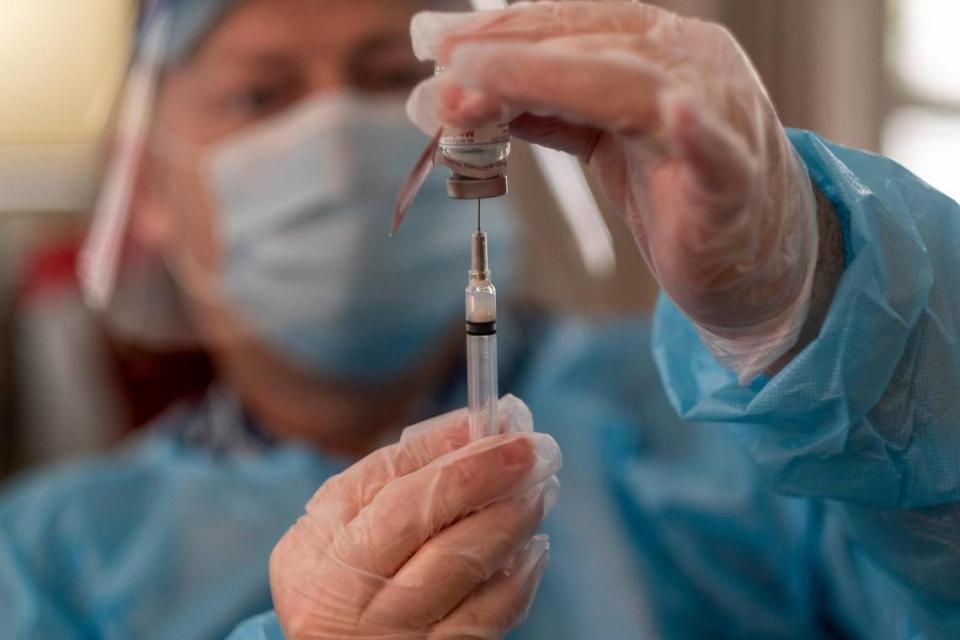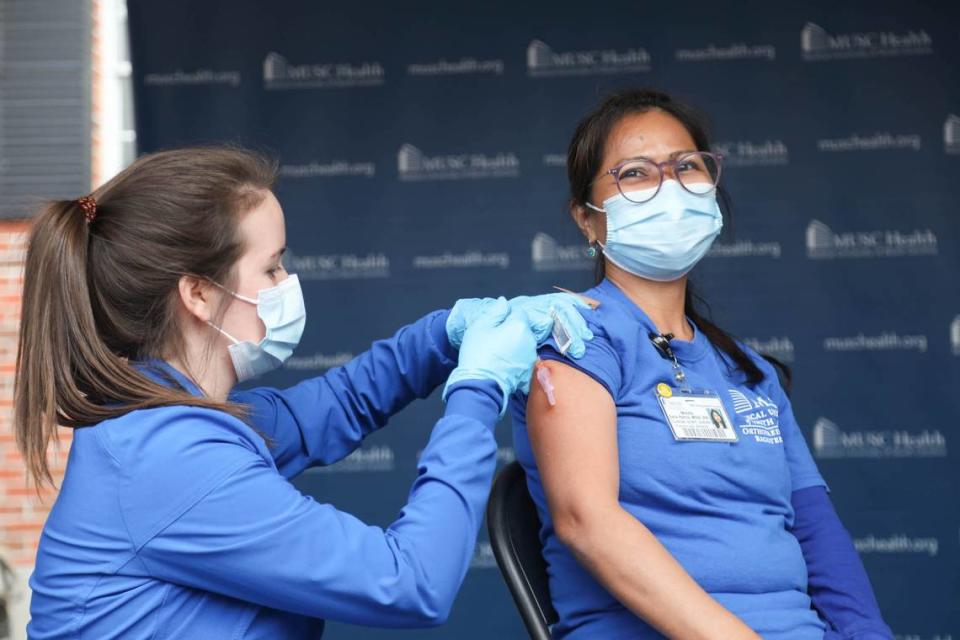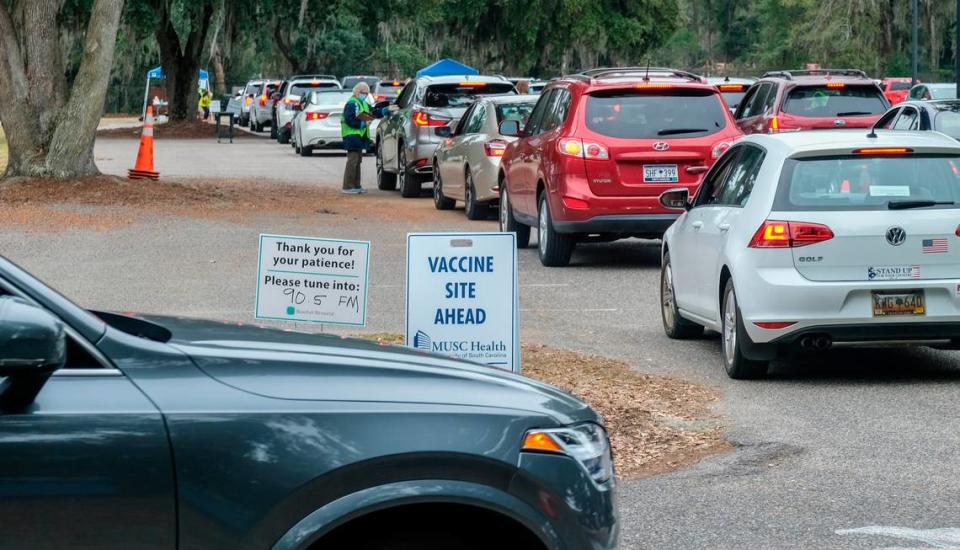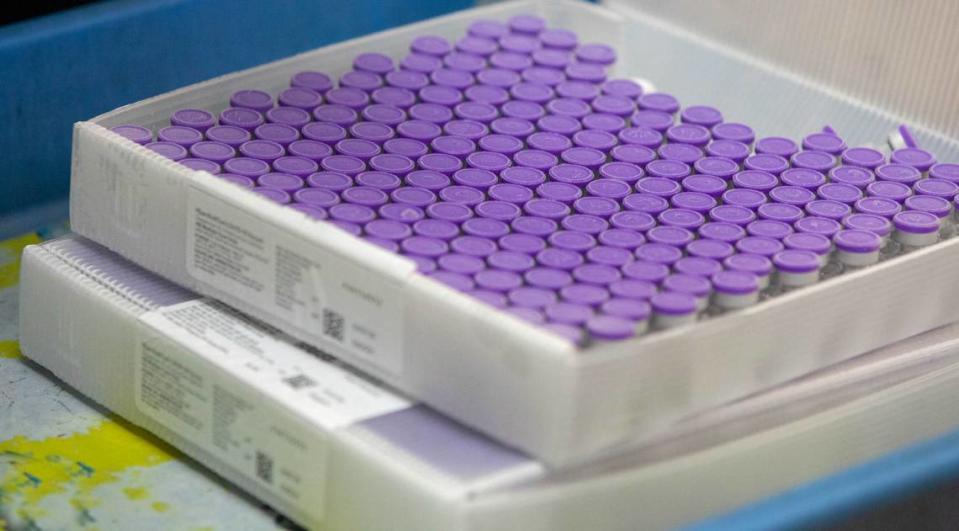SC health experts offer safety tips on ‘devastating’ UK coronavirus variant
New coronavirus variants are rapidly spreading around the world, frightening health leaders and complicating mass vaccination campaigns.
South Carolina late last month confirmed two such variants in the state, B.1.1.7 and B.1.351. Both formed as the coronavirus naturally mutated over time:
B.1.1.7, first identified in the United Kingdom last year, is more transmissible and probably deadlier than the original SARS-CoV-2 strain, according to U.K. scientists.
B.1.351 was first discovered in South Africa four months ago and could be harder to control with COVID-19 vaccines.
To help South Carolinians better navigate the crisis, The Island Packet and Beaufort Gazette asked four Palmetto State health experts to weigh in on the variants.
Questions & Answers
Q: Should South Carolinians be double-masking?
Dr. Helmut Albrecht, medical director of the Center for Infectious Diseases Research and Policy at Prisma Health and the University of South Carolina and USC’s Heyward Gibbes Distinguished Professor of Internal Medicine: In all honesty, I believe that discussion is moot. More than 99% of infections are transmitted because the person who infected someone else did not wear any mask, not because someone didn’t have a second mask. Getting people who don’t mask now to wear one mask will do 100x more good than having people switch from one to two masks, but I have no problem with people practicing dual-masking.
Dr. Krutika Kuppalli, assistant professor in the division of infectious diseases at the Medical University of South Carolina in Charleston and vice chair of the global health committee at the Infectious Diseases Society of America: I think more importantly than focusing on whether or not to double mask, South Carolinians should concentrate on wearing at least one good face mask. The most important thing about a face mask is that it fits snugly across your nose, mouth and chin so there are no spaces to let droplets in, and it should be made of numerous layers of fabric.
Lior Rennert, assistant professor of biostatistics at Clemson University: Everybody should wear a mask when out in public or when around people outside of their inner circle. For those at high risk, I would recommend wearing two masks.
Michael Sweat, director of MUSC’s Center for Global Health and director of the COVID-19 Epidemiology Intelligence Project: Yes. This significantly reduces risk of both transmitting and acquiring infection. The Centers for Disease Control and Prevention now recommends double-masking based on scientific evidence.
Q: Are you double-masking?
Albrecht: No.
Kuppalli: No. I make sure to wear a mask that fits appropriately. By that I mean the mask fits well and covers my mouth and nose and lays flat against my cheeks.
Rennert: No.
Sweat: Yes, but depending on the situation. When I must be inside where there are other people, such as at the pharmacy or grocery store, I add a surgical mask to my regular mask. If I am outside walking the dog, I tend to just use a surgical mask since I rarely get close to people and it is outside where it is safer.
Q: Considering the unconnected South African variant cases discovered in South Carolina last month, how likely is it that B.1.351 is spreading widely around the state?
Albrecht: It’s very likely. More adapted viruses tend to take over. This does not mean they will necessarily cause a surge, but they will in a couple of weeks/months be the majority of the clones.
Kuppalli: Given there is no epidemiological link between the two cases and they are in different parts of the state, I am concerned there is community spread of the B.1.351 variant and we should presume that this is the case.
Rennert: It’s very likely.
Sweat: We need more genetic sequencing to know whether the South African variant is widely circulating. However, there is serious cause for concern. It was worrying that these two cases had no history of travel and did not know each other. That suggests there may be considerable circulation of this variant. It is enough to recommend that people really should double down on prevention efforts.

Q: What about the U.K. variant, B.1.1.7? Do you think it’s rapidly spreading in the state?
Albrecht: Yes, as per above.
Kuppalli: Yes, we should assume that the B.1.1.7 variant is also spreading in the state and take precautions as if it is doing so.
Rennert: If it is not currently, it may soon.
Sweat: Again, we need more sequencing to know for sure, but based on how quickly it spread in the U.K., and other countries like Denmark, I suspect it has gained a foothold in South Carolina. A recent report found 147 cases of the U.K. variant in Florida, right next door. There is a good chance that this variant will become the predominant one in the U.S. eventually, and maybe the world.
Q: Have you started to do anything differently to protect yourself or your family from COVID-19, given the variants’ spread?
Albrecht: No, we have always been strict about avoidance measures. As these measures (hand hygiene, universal masking, frequent testing, avoidance of crowds, etc.) work together, we have been able to avoid being infected, despite me getting exposed several times per day. All of these measures also help against variants and are probably even more important in this scenario given the variants’ transmissibility.
Kuppalli: I have been extra vigilant about my public health measures, which include my hand hygiene, physical distancing, wearing my face mask and avoiding crowds of people and poorly ventilated spaces. It is extra important at this time.
Rennert: No. I continue to practice safe physical distancing (when possible) and wear a mask in public.
Sweat: Me and my family have been stringent thus far and follow the preventative guidelines strictly. So, no, we have not changed much. These variants have raised our general level of worry and thus reinforced that we need to keep sticking with the prevention behaviors like mask use and avoiding indoor gathering.
Q: Why is it important to monitor for these variants?
Albrecht: The variants we have been discussing are fairly basic adaptations of the virus to its environment. The virus is simply getting better at being a virus. Some of the variants, however, could have other abilities, i.e. be more deadly or be resistant to our antivirals or not be affected by antibody therapies. Therefore, it is important to know what is around. Variants also allow us to model spread, i.e. reconstruct which event led to the spread, so-called molecular epidemiology
Kuppalli: The emergence of new variants may lead to a virus that has different characteristics. It is important to understand how these changes affect the characteristics of the virus and use this information to predict how it might impact the health of the population.
Rennert: It’s important for tailoring testing, treatments and vaccination to best handle these variants.
Sweat: All along, COVID-19 has been challenging because rapid changes in transmission can occur before it can be detected. The earliest indicator of increased cases in the community is when people test positive for the COVID-19 virus. But it takes time for people to get sick and then navigate getting tested, and by the time we start to see increases, the virus may have spread substantially. The same is true with detection of variants. Knowing early that variants are spreading allows us to alert and warn the population, which can help to reinforce the need to be vigilant with prevention. It also allows for scientists to assess if vaccines being used are going to need to be updated.

Q: What is “vaccine escape”?
Albrecht: Vaccines create a protective immune response against a particular type of virus. If the virus is so mutated that the target of the vaccine-induced immune response is not affected anymore, the protection the vaccine offers is diminished. B.1.351, for instance, is covered by the mRNA vaccines but seems to be able to escape the Oxford University-AstraZeneca vaccine, which is not available in the U.S.
Kuppalli: It’s when the human immune response generated by the vaccine is no longer effective in preventing infection.
Rennert: Vaccination may not protect against all potential variants and strains of a virus (e.g., influenza). Vaccine escape is when some of these variants/strains escape vaccination coverage.
Sweat: That is when a virus has mutated such that it is no longer suppressed by a vaccine. Often that will also mean that a virus is not suppressed by natural immunity acquired from a prior infection, meaning you could get infected a second time with the new, mutated version of the virus.
Q: Should residents be worried about the effectiveness of Pfizer-BioNTech or Moderna’s vaccines against B.1.351 and B.1.1.7?
Albrecht: No. They are not optimal but (are) still highly protective. The variants were around before the vaccines were rolled out. (The variants) are therefore not due to vaccine exposure. It is also technically easy to tweak mRNA vaccines.
Kuppalli: Studies so far demonstrate that both vaccines are effective against the B.1.1.7 variant, and although still effective, have decreased neutralizing antibody production against B.1.351. Moderna and Pfizer-BioNTech have verified that they are able to develop booster shots as needed for their vaccines.
Rennert: There is evidence that the vaccine is still effective against these variants. However, more information needs to be collected to determine exactly how effective. For the near future, those vaccinated should still practice safe physical distancing and mask wearing.
Sweat: For now, available scientific studies suggest that both the Pfizer and Moderna vaccines are effective against the B.1.1.7 variant that was first identified in the U.K. I think that the bigger worry is the South African variant, which has been shown to evade the AstraZeneca vaccine, and lab studies indicate that the Pfizer and Moderna vaccines are less effective against the South African variant. Genetic mutations happen much faster when there is a lot of transmission occurring, so the best defense we have is to get as many people vaccinated as soon as possible, and to double down on prevention measures.
Q: Do you think B.1.1.7 will become the dominant variant in South Carolina? If yes, when?
Albrecht: Yes, in a couple weeks or months.
Kuppalli: The B.1.1.7 variant is predicted to become the dominant variant in the United States and possibly the world.
Rennert: It is highly possible, but difficult to say if and when.
Sweat: The CDC has projected that the B.1.1.7 variant will become the predominant variant in the U.S. in the next few months. Based on what you see in other countries, I believe they are probably right about that.

Q: Are you worried about this situation?
Albrecht: I am more worried about the ongoing evolution of the virus. If we allow the virus to spread as it has, because we do not take precautions seriously enough (no distancing, not masking and not enough testing), each generation of virus creates new variants. Combined with a much-too-slow rollout of the vaccines, this is a recipe for failure.
Kuppalli: It is a race between the variant and the vaccine. The B.1.1.7 variant has increased transmissibility, which means that it can lead to increased cases, hospitalizations and deaths. This is why it is so important for us to control the amount of circulating virus and to get people vaccinated. All you have to do is look at the U.K. to see how devastating this variant has been.
Rennert: Not overly concerned. We always expected there would be variants, and it is likely the vaccines will be tailored to accommodate them.
Sweat: Yes. The big-picture issue that emerges from the news of these variants is two-fold: (1) the virus mutates fast enough that we will need to regularly update the vaccines to be effective against new variants and strains, as we now do with influenza, and (2) we really will need to vaccinate globally, since if we allow massive transmission to continue in other countries, the number of new strains will continue to pop up rapidly, making control through vaccination challenging. On the positive side, the investments in the production of vaccines — from the biologic strategies to the plants that produce the vaccines — will allow us to do that. I believe we will get there in solving this problem, and it will look like annual flu shots.
Q: What other variants should South Carolinians keep an eye on?
Albrecht: We are tracking over 4,000 different mutations (around the world), which in combination have created 100,000s of variants. Vaccine escape mutants would be my biggest concern.
Kuppalli: Brazil (P.1) and California (CAL.20C).
Rennert: There will always be variants. It’s more important to follow DHEC recommendations on vaccination and physical distancing, and mask mandates, since these will be the approaches to combat all potential variants or strains.
Sweat: We do not know what they are yet. As long as we have the kind of high rates of transmission as we currently do, we will see a high mutation rate of the virus. Thus, we need a system to constantly sequence the viral genome to identify new variants. We definitely have the science to do that.
Q: What should residents do to protect themselves as the variants continue to circulate?
Albrecht: Continue to be careful (masking, distancing, hand hygiene, etc.) and avoid exposure to potentially infected patients. Get vaccinated when it becomes available to you.
Kuppalli: I would encourage people to double down on their public health measures — use good hand hygiene, make sure to wear a face mask that fits appropriately, maintain appropriate physical distance, avoid crowds of people, and if you meet with people, stay outdoors. I would also urge people to avoid travel if possible and also to get vaccinated when their chance comes. This is how we will get the pandemic under control — we all need to do our part.
Rennert: Follow the DHEC recommendations.
Sweat: Get vaccinated as soon as you can when a vaccine is made available to you and encourage your family and friends to do the same. Double down on prevention behaviors, especially using masks and avoiding indoor spaces with others.
Editor’s note: Responses have been edited for clarity and style.


